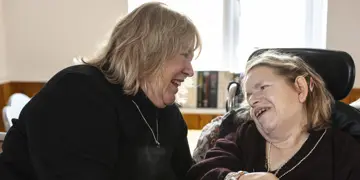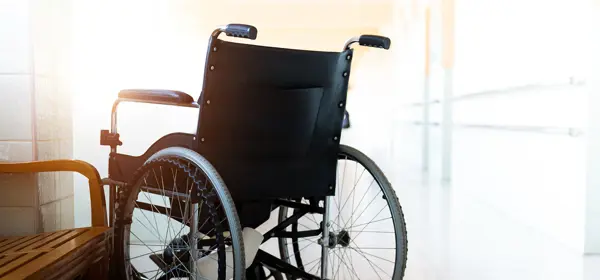A life-shortening inequality — how patients with learning disabilities are let down
A life-shortening inequality — how patients with learning disabilities are let down
Patients with learning disabilities die earlier, and are more likely to die from avoidable causes. Campaigners say there needs to be better training, more specialist staff and greater insight into their complex needs. Seren Boyd reports
Every time Julie gets the call to say her sister, Caroline, is in hospital, her first thought is always the same: ‘They’re going to kill her.’
Caroline (pictured above, right), who is quadriplegic with a severe learning disability, is usually admitted with ‘something minor’; a chest infection or because her percutaneous endoscopic gastrostomy tube needs replacing. She is generally ‘a fit, healthy woman’, says Julie (pictured above, left).
However, in hospital, Caroline’s condition often deteriorates because ward teams don’t have the specialist skills or equipment to care for her well.
Caroline is at high risk of choking. Yet, in the absence of wheelchairs or hoists, she is left in bed, unable to stay upright. So, she often aspirates and is prone to pneumonia; she once had near-fatal sepsis.
Caroline, who is 60, is also non-verbal. She cannot easily communicate discomfort or distress, so she is dependent on medical staff checking up on her. But on a busy ward, far from receiving special care, she tends to be overlooked.
The human touch
Julie has found her sister lying in a wet bed, wearing plasters she is allergic to or fitted with a nasal bridle so tight it had become embedded in her septum.
On one occasion, she arrived to be told Caroline had been ‘making this horrible noise for hours and we don’t know why’. It was Julie who identified Caroline’s fingers had turned black owing to a wrongly inserted cannula.
What can be just as upsetting is the absence of ‘small, human things’ in Caroline’s care, such as greetings from staff distributing meds, a kind word when the cannula goes in. Nurses rarely speak to her sister, Julie says.
‘Who is there reassuring her, who is comforting her and explaining? They look at somebody who doesn't talk, who isn't in control of her body, and assume she is brain dead, and actually she is not.’
Julie insists much of the care Caroline receives in hospital could be delivered in the specialist environment of her care home – where she would be safer.
But, even though she is her closest living relative, Julie doesn’t have access to advocate for her sister in either primary or secondary care.
Who is there reassuring her, who is comforting her and explaining?
Julie. whose sister has a severe learning disability
The only occasions when the hospital has contacted Julie directly have been to ask her to agree to a DNA (do not resuscitate) CPR order for Caroline, without explanation, much to Julie’s distress.
‘It doesn’t matter what she goes in for, they turn into horrendous, traumatic experiences. She is a fighter. She wants to stay on this earth. And as long as she takes a breath, I'm going to fight for her to be here. But I need other people on board with that.’
Health checks
The health inequalities which affect the 1.5 million people in the UK with learning disabilities are alarming.
On average, women with learning disabilities die 23 years earlier than the general population, and men 20 years earlier, says learning disability charity Mencap. Average life expectancy for people with a learning disability from a minority ethnic background is 34.
People with a learning disability are twice as likely to die from avoidable causes, according to Lord Darzi’s 2024 investigation of the NHS in England. Areas such as respiratory care and cancer care were ‘of particular concern’, he says.
There have been attempts to address these inequalities. Since 2015, the annual LeDeR report (Learning Disabilities Mortality Review) has sought to investigate and learn from these avoidable deaths in England. The Health and Care Act 2022 introduced Oliver McGowan Mandatory Training on Learning Disability and Autism for health and social care staff.
Mencap says measures such as annual health checks for patients on the GP learning disability register have improved life expectancy by a year. Yet it warns that trend may not be sustained in the forthcoming LeDeR report.
As the Darzi report points out, about three-quarters of people with a learning disability are not even on the register. A target to reach 75 per cent of people on the register with an annual health check was dropped from NHS England’s planning guidance for 2025-26. The quality of checks varies significantly, says Mencap.
Meanwhile, the number of learning disability nurses in England has declined by 44.1 per cent since 2010-11. Lack of career progression, burnout and lack of awareness about what the role entails are among the contributing factors, says Mencap’s head of policy Dan Scorer.
Individual staff members can make a difference, he insists: ‘We would expect first and foremost that any doctor treating Caroline [would] see her as a person first. We would want them to be considering her disability through the lens of, “how could we support you?”, rather than making any value judgements or negative assumptions about her quality of life.’
But, says Mr Scorer, individual staff members can only do so much in an over-stretched system designed for ‘people with just one health problem’.
‘There is a lack of support for the whole system to adapt to meet the complex health and support needs of people with a learning disability. Proper funding and prioritisation are critical to end healthcare inequality.’
Diagnostic confusion
Maria Vincent’s role is a creative, somewhat unconventional response to at least some of the issues Julie and Mr Scorer identify.
Dr Vincent is a community-based GP specialist in learning disability medicine working at Swansea Bay University Health Board’s LDS (learning disability service). She believes the service she offers is unique in the UK.
She works alongside the LDS’s psychiatry team and the community learning disability team to care for more complex patients who, for example, may have multiple disabilities as well as autism and/or epilepsy. Broadly speaking, her role is to help individual patients access treatment in the best way and best place possible for them, preferably their home or care setting.
This often involves advanced problem-solving, especially if a patient’s behavioural issues make it hard for them to go to their GP or hospital in the normal way. Dr Vincent has been part of multidisciplinary teams where up to seven different specialties have come together to treat a patient under anaesthetic in one procedure.
More often, it is about taking the time to unravel complex webs of comorbidities and disabilities and helping the LDS team distinguish between medical and psychiatric issues.
This matters because ‘diagnostic overshadowing’ – when a patient’s symptoms or behaviours are attributed to their learning disability without exploring other physical or mental health causes – is a major contributor to those early, avoidable deaths, according to a 2024 report by the parliamentary women and equalities committee.
‘We've got one patient who has got concurrent palliative needs alongside potential reversible causes, alongside multiple disabilities,’ says Dr Vincent.
‘How do you unpick that?’ She would like to see learning disability medicine recognised as its own specialty.
Without the benefit of experience, it’s not hard to miss easily treatable conditions in this patient group, for example a patient with constipation who continues to pass stools.
‘The care staff think that the bowels are normal, and tell the GP the bowels are normal, but actually they are impacted, which can cause reflux, which can cause aspiration, and then multiple chest infections, and so things spiral.’
Every doctor needs to know how to work with people with a learning disability
Penny Letchford
Some of her patients in the specialist learning disability service hadn’t seen a GP in quite some time. Dr Vincent, who separately from this role works as a GP in the Vale of Neath, understands how this can happen.
‘The GP practice will say, “come down and see us”, but then because of behavioural complexities the patient doesn’t attend. The individual loses confidence and the practice perhaps gets frustrated. So the person is left with nowhere to turn.’
Things are improving, however. Many GP practices in south Wales have signed up to a national ‘supplementary service’ wherein, for example, they access resources and training on learning disabilities through the Paul Ridd Foundation. There are similar hopes for the parallel roll-out of Oliver McGowan training in England. These will soon become core for all practices, as efforts to improve access and care continue.
Dr Vincent’s role is about creating efficient care pathways for patients ‘for whom there is no standard care route’. Individualised care is essential – and standard protocols just aren’t possible.
What is always possible, however, for anyone delivering healthcare, is treating patients such as Caroline with respect and dignity, Dr Vincent insists.
‘Rather than thinking, “this is a person with a learning disability. How do I communicate with them?” you have to look at that individual as a person and think: “What needs do they have and how can I get the most out of this consultation?”’
Swansea Bay LDS now covers two other health boards – Cwm Taf Morgannwg and Cardiff and Vale University – and has become something of a learning hub for learning disabilities. Other health boards in Wales are now interested in replicating Dr Vincent’s role.
Dr Vincent’s expertise in learning disability medicine has developed through her own intentional focus on this patient group, rather than through any specialist training.
Similarly, her role in Swansea Bay’s LDS was the fruit of lateral thinking: how to address the needs of a struggling patient group in a service which was struggling to recruit specialty doctors.
The service’s clinical director is consultant learning disability psychiatrist Penny Letchford. She says ‘thinking differently’ about team structure has been central. And as they look to develop the service, with plans such as a new purpose-built hospital for patients with the most complex needs, partnering with a wide range of other stakeholders is essential.
Potential for change
Staffing remains a major issue, even for Swansea Bay LDS whose scale, collective expertise and community of support make it more attractive to applicants, Dr Letchford believes.
Part of the problem is lack of trainees and lack of awareness about the specialty. ‘In the job you have to think outside the box all the time,’ she says. ‘It's nothing you got taught in medical school.’
Of those who join Swansea Bay LDS for foundation-year placements or special-study modules, a good number stay on, says Dr Letchford. ‘It’s just about getting them through the door initially.’
But, she insists, ‘every doctor needs to know how to work with people with a learning disability.
‘I don't think anybody in the health profession purposely sets out not to treat these people: I think they either haven't had the training or they feel out of their depth.’
Dr Vincent believes that, as they are living longer, people with learning disabilities will need to be a greater focus and priority in medicine. For such an underrepresented group, the potential for real and meaningful change is vast, she says.
‘The only way forward is to try and see potential, whether that's in someone who can't speak in the normal way or in what the NHS can become if we want it to be.’
- Charities such as Mencap and the Paul Ridd Foundation offer learning disability training and resources for healthcare professionals
(Images credit: Tarkan Align / Mencap)




![ID Badge[1]](/media/inafr0jf/id-badge-1.jpg?rxy=0.5104415529901178,0.4163862308450141&width=600&height=600&format=webp&v=1dbae09dc4f8820)
